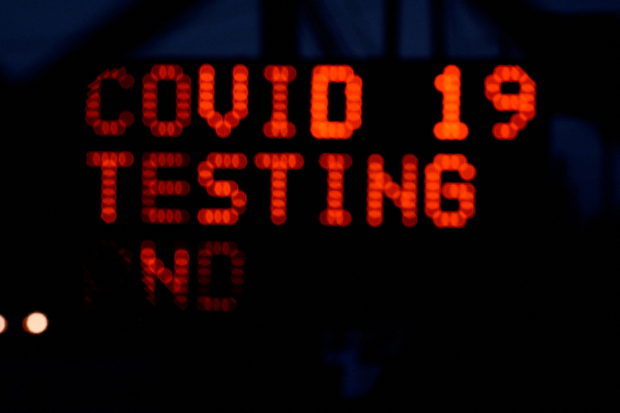Virus leaves antibodies that may attack healthy tissues; B cell antibodies weakened, not defeated by Omicron

A sign advertises coronavirus disease (COVID-19) testing outside the Indianapolis Motor Speedway, as the Omicron variant continues to spread in Indianapolis, Indiana, U.S., December 29, 2021. REUTERS FILE PHOTO
The following is a summary of some recent
studies on COVID-19. They include research that warrants further
study to corroborate the findings and that has yet to be
certified by peer review.
Coronavirus leaves survivors with self-attacking antibodies
Months after recovering from SARS-CoV-2 infection, survivors
have elevated levels of antibodies that can mistakenly attack
their own organs and tissues, even if they had not been severely
ill, according to new findings.
Among 177 healthcare workers who had recovered from
confirmed coronavirus infections contracted before the
availability of vaccines, all had persistent autoantibodies,
including ones that can cause chronic inflammation and injury of
the joints, skin and nervous system. “We would not normally
expect to see such a diverse array of autoantibodies elevated in
these individuals or stay elevated for as long six months after
full clinical recovery,” said Susan Cheng of the Cedars-Sinai
Smidt Heart Institute in Los Angeles. Patterns of elevated
autoantibodies varied between men and women, the researchers
reported on Thursday in the Journal of Translational Medicine.
“We don’t yet know how much longer, beyond six months, the
antibodies will stay elevated and/or lead to any important
clinical symptoms,” Cheng said. “It will be essential to monitor
individuals moving forward.” Her team is investigating whether
autoantibody elevations are linked with persistent symptoms in
people with long COVID and planning to study autoantibody levels
after infections with newer variants of the virus.
B cells’ effects weakened but not defeated by Omicron
The effects of antibodies produced by the immune system’s
“memory B cells” against the Omicron variant of the coronavirus,
while weakened, could still be significant, researchers believe.
Once the body learns to recognize SARS-CoV-2, either after
infection or vaccination, B cells generate fresh antibodies
against the virus if there are not already enough antibodies
circulating in the blood that can neutralize it. In a study
reported on bioRxiv ahead of peer review, researchers analyzed the strength of more
than 300 antibodies produced by memory B cells obtained from
vaccinated volunteers, including some who had a prior SARS-CoV-2
infection.
“Omicron seemed to evade a very large share of the memory B
cells pool,” researchers said, adding that it “seems to still be
efficiently recognized by 30% of total antibodies and close to
10% of all potent neutralizing antibodies,” said Matthieu
Mahevas and Pascal Chappert of Universite de Paris in a joint
email. Memory B cells’ robust ability to proliferate and produce
antibodies might compensate “in less than two days” for those
antibodies’ reduced effectiveness, they speculate.
In combination with other immune system components,
particularly T cells, the effects of B cells likely help to
explain why most vaccinated individuals who become infected do
not become sick enough to require hospitalization, they said.
Virus variants’ activity in cells makes them more effective
Along with spike mutations that help the coronavirus break
into cells, mutations that change how the virus behaves inside
the cells are a big factor in why some variants have been more
transmissible, researchers have discovered.
The findings, published in Nature,
show that scientists “have to start looking at mutations
outside the spike,” which has so far been the main focus of
vaccines and antibody drugs, said Nevan Krogan of the University
of California, San Francisco. Studying the Alpha variant, his
team found a mutation at a non-spike site that causes infected
cells to ramp up their production of a protein called Orf9B.
Orf9b in turn disables a protein called TOM70 that cells use to
send signals to the immune system. With higher levels of Orf9B
disabling TOM70, the immune system does not respond as well and
the virus can better evade detection, the researchers said.
Referring to the increase in Orf9B, Krogan said, “It’s rare
that mutations ‘turn up’ a protein. It’s a very sneaky thing for
this virus to do.” The same mutation was identified on Delta,
“and sure enough, almost the same mutation is on Omicron,” he
said, which suggests they may have similar effects on the immune
system. The new information could spur development of drugs that
target the interaction of Orf9b and TOM70.
RELATED STORIES
Most COVID-19 cases showed symptoms, almost half were hospitalized — study
Omicron five times more likely to reinfect than Delta, study says
For more news about the novel coronavirus click here.
What you need to know about Coronavirus.
For more information on COVID-19, call the DOH Hotline: (02) 86517800 local 1149/1150.
The Inquirer Foundation supports our healthcare frontliners and is still accepting cash donations to be deposited at Banco de Oro (BDO) current account #007960018860 or donate through PayMaya using this link.